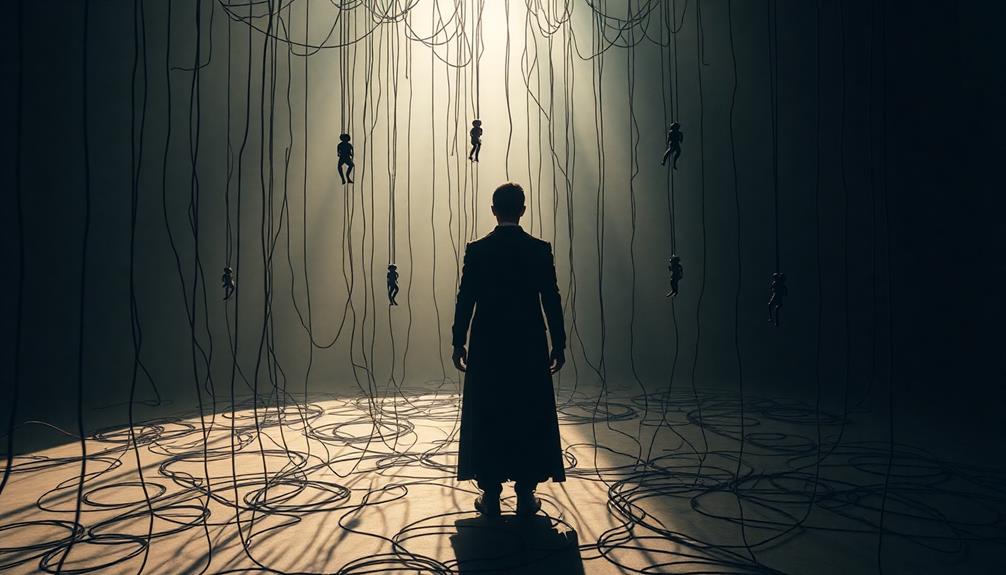You might feel like you're in control of your choices, but recent research suggests otherwise. Neuroscience indicates that your brain often makes decisions seconds before you're even aware of them. This challenges the notion of free will, leading some to argue that you're more like a puppet, influenced by past experiences and external factors. Hard determinists assert that if your actions are predetermined, moral responsibility becomes questionable. Yet, others propose that free will and determinism can coexist, prompting reevaluation of how you perceive accountability. There's much more to explore about this complex relationship between freedom and choice.
Key Takeaways
- Free will is often viewed as an illusion influenced by subconscious factors, brain activity, and prior experiences, questioning personal agency and moral responsibility.
- Determinism posits that choices are predetermined by prior events, leading to debates about accountability and the nature of free will.
- Neurological studies show that brain activity can precede conscious decisions, suggesting that our choices may not be as free as they seem.
- Cultural interpretations of freedom vary, emphasizing moral responsibility and ethical choices over unchecked individual desires.
- Belief in free will is crucial for societal cohesion; skepticism can lead to moral disengagement and hinder personal growth.
Understanding Free Will
When you think about free will, it's vital to recognize that it represents your ability to make choices without being constrained by external influences. This concept is central to how human beings perceive personal agency and moral responsibility. Philosophers have debated the existence and implications of free will for centuries, with thinkers like Galen Strawson and Pierre-Simon Laplace shaping the conversation.
Additionally, the understanding of how our subconscious influences decision-making mirrors principles found in the Law of Attraction in sports, where mindset plays a significant role in performance.
Neuroscientific findings, particularly Benjamin Libet's experiments, challenge traditional views by showing that brain activity can occur several seconds before you're consciously aware of a decision. This raises questions about whether you truly have free will or if your choices are predetermined by brain processes.
Despite these challenges, many contemporary philosophers endorse compatibilism, which suggests that free will can coexist with determinism. This perspective allows for voluntary actions even if causal chains influence your decisions.
Understanding free will is essential because it affects how you view moral responsibility; if you believe your choices are truly yours, you're more likely to hold yourself accountable for your actions. Ultimately, grappling with these ideas helps clarify your beliefs about agency and ethics in everyday life.
The Determinism Debate

When you consider determinism, you confront the idea that every choice you make might be predetermined by prior events and natural laws. This raises important questions about your moral responsibility—if your actions are foreseen, can you truly be held accountable?
In relationships, the impact of past experiences can often shape our choices and reactions, highlighting the importance of clear communication during a breakup.
Understanding this debate can reshape how you view your own decisions and their consequences.
Determinism vs. Free Will
The debate between determinism and free will captivates many, questioning whether our choices are genuinely ours or merely the result of prior conditions.
Determinism argues that every event, including human actions, follows a predetermined sequence shaped by natural laws and previous events. In this deterministic world, hard determinists claim that free will might be an illusion, asserting that our choices are merely outcomes of prior influences. Classical proponents like Baron d'Holbach and modern defenders such as Ted Honderich support this view.
This debate can be further complicated by understanding how mental health conditions, such as BPD's emotional instability, influence decision-making processes and relationships.
However, the concept of quantum indeterminism introduces randomness at the micro-level, suggesting that, while some events may appear deterministic, not all are predictable. This leads some philosophers to explore compatibilism, which posits that free will and determinism can coexist. Compatibilists focus on voluntary actions, arguing that even if our choices are influenced, we can still act according to our desires.
While some, like Derk Pereboom, contend that moral responsibility can exist without traditional notions of free will, it's crucial to understand that acknowledging behavioral influences might reshape how we view accountability.
The complexity of this debate keeps us pondering the nature of our choices and their implications.
Impacts on Moral Responsibility
Exploring the impacts of determinism on moral responsibility reveals a complex interplay between choice and accountability. If you consider that your actions might be predetermined by factors beyond your control, it raises critical questions about moral responsibility. This debate challenges the very essence of what it means to be accountable for your actions.
- Hard determinists argue that moral responsibility is unattainable if choices stem from biological and environmental influences. Additionally, individuals experiencing emotional abuse, such as gaslighting in custody battles, may find their capacity for making autonomous decisions severely compromised.
- Research shows that belief in free will is closely tied to moral accountability; doubting your agency can increase unethical behavior.
- Legal cases highlight how circumstances like addiction can mitigate moral responsibility, suggesting a need for nuanced perspectives on culpability.
- The implications of free will skepticism can shift societal norms, promoting empathy over judgment for those in difficult situations.
- Reevaluating punishment and rehabilitation may lead to more compassionate approaches in the justice system.
Ultimately, if free will really is an illusion, understanding that many factors influence behavior can reshape how you perceive personal accountability and morality. Acknowledging these complexities can foster a more empathetic society focused on rehabilitation rather than retribution.
Biblical Insights on Free Will

Biblical insights on free will reveal a complex relationship between human choice and divine sovereignty. While scripture emphasizes your ability to make choices and actions, it also indicates limitations on your moral capacity. For instance, Jeremiah 10:23 suggests you can't fully direct your own steps, pointing to an inherent lack of free will in moral decision-making.
The following table summarizes key biblical perspectives on free will:
| Concept | Biblical Reference |
|---|---|
| Total Depravity | Romans 3:10-12 |
| Moral Corruption | Jeremiah 10:23 |
| Sin as Slavery | Galatians 5:1 |
| Accountability | 2 Corinthians 5:10 |
| Freedom through Righteousness | John 8:36 |
These scriptures imply that while you have the freedom to make choices, you're also responsible for your actions, and your nature may hinder true moral freedom. Understanding this biblical perspective can deepen your appreciation for the balance of divine sovereignty and human responsibility in the moral sphere.
Cultural Perspectives on Freedom

When you think about freedom, consider how different cultures interpret it. While many see freedom as the ability to choose whatever they want, biblical teachings highlight that true freedom lies in making choices that align with righteousness.
This understanding can be echoed in the importance of celebrating relationships, where the impact of our choices on others is emphasized.
This contrast can shape how you view your responsibilities within your community and the impact of your choices on others.
Misinterpretations of Freedom
The concept of freedom often gets tangled in cultural interpretations that prioritize individual desires over moral responsibility. Many people misconstrue freedom as the liberty to act without restraint, overlooking the profound implications of their choices. This perspective leads to misinterpretations of freedom that can erode community bonds and ethical standards.
Furthermore, engaging in trust-building activities can enhance understanding and accountability within relationships, highlighting the interconnectedness of our choices.
Consider these points:
- True freedom involves making choices aligned with moral values.
- Sin can be seen as a form of slavery that limits genuine freedom.
- Embracing self-restraint fosters deeper connections within a community.
- Cultural narratives often ignore the consequences of unchecked individualism.
- Faith can guide individuals towards discerning free choices from compulsions.
When you focus solely on personal liberty, you risk neglecting your responsibilities to others. Understanding true freedom means recognizing that your choices impact not just you but the entire community.
Biblical vs. Cultural Freedom
Many people equate freedom with the ability to act without limits, but this cultural perspective often overlooks deeper moral implications. While cultural freedom emphasizes personal liberties, it can lead you to prioritize self-interest over moral responsibility. In contrast, biblical freedom offers a more profound understanding of what it means to be truly free.
| Aspect | Cultural Freedom | Biblical Freedom |
|---|---|---|
| Definition | Liberty to act without restraint | Ability to choose good over evil |
| Moral Responsibility | Often neglected | Central to the concept |
| Outcome | Can encourage selfish behaviors | Promotes love and self-restraint |
| True Freedom | Absence of constraints | Empowered action aligned with divine principles |
Galatians 5:1 reminds you that biblical freedom involves liberation from sin, equating it to true righteousness. Here, genuine freedom isn't just the absence of constraints; it's the empowered ability to act ethically. Church teachings emphasize making choices that reflect integrity and service to others, providing a stark contrast to the notion of unrestrained personal choice. By understanding these distinctions, you can appreciate the richness of biblical freedom and its call to moral responsibility.
Community and Choice

In vibrant communities, your conscious choices play a significant role in shaping the environment around you. When you believe in free will, it empowers you to act with integrity, fostering kindness and connection. This belief becomes a catalyst for change, transforming passive members into active participants, which enhances social bonds and collective well-being.
Engaging with resources like best parenting books for discipline can help you understand how to foster positive behaviors within your community and encourage emotional intelligence among its members.
Consider how your actions can impact your community:
- Your choice to volunteer can inspire others to contribute.
- Acts of kindness can create ripple effects, fostering a supportive atmosphere.
- Engaging in open dialogue helps clarify the difference between free choices and compulsions.
- Personal transformation often starts with a single decision to break negative cycles.
- Collective decision-making strengthens community ties and promotes shared values.
Philosophical Perspectives
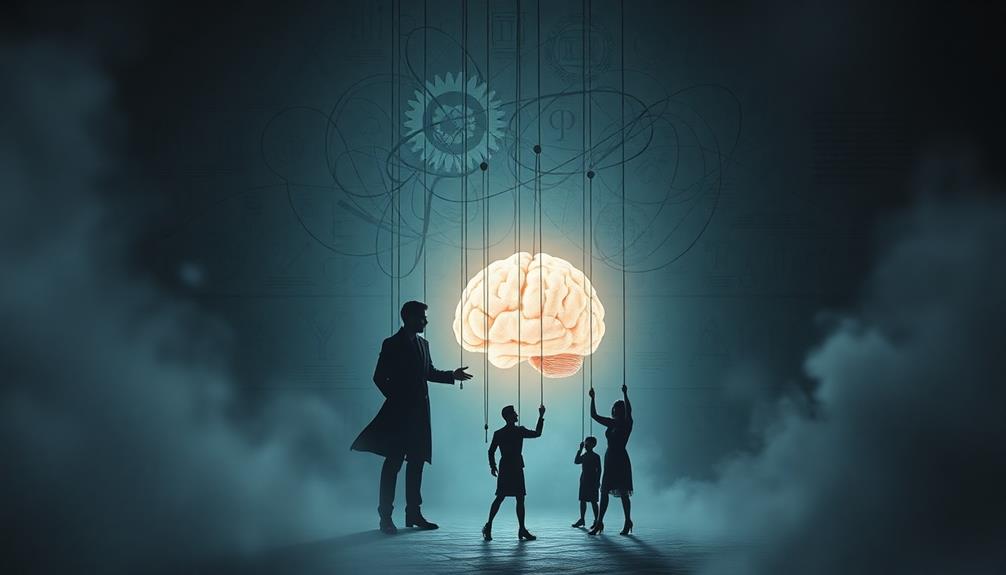
Understanding how your choices shape your community naturally leads to exploring the deeper philosophical implications of free will. Throughout history, philosophers have debated whether humans genuinely possess free will or if our actions are determined by causal laws. This discourse takes on further significance in light of advancements in technology, particularly with AI's evolving capabilities, which raises questions about the nature of human decision-making and autonomy.
Pioneers like Pierre-Simon Laplace suggested that if one could know all variables in the universe, they could predict every future event, a notion that challenges the idea of free agency. Many contemporary philosophers argue that believing in free will might be an illusion, raising emotional concerns for those who fear losing their sense of agency.
Yet, compatibilism offers a different perspective, asserting that free will and determinism can coexist. Proponents, like Daniel Dennett, maintain that your voluntary actions can still emerge from causal chains. Meanwhile, critics of free will skepticism, such as Alfred R. Mele, emphasize the necessity of moral responsibility, even in light of neuroscience's challenges.
This philosophical discourse is significant, as your belief in free will directly influences societal views on accountability and moral judgment, especially in an era where AI's transformative role prompts critical reflection on human agency. Ultimately, grappling with these perspectives helps you navigate the complexities of human behavior and ethics in your community.
Neurological Evidence Against Free Will
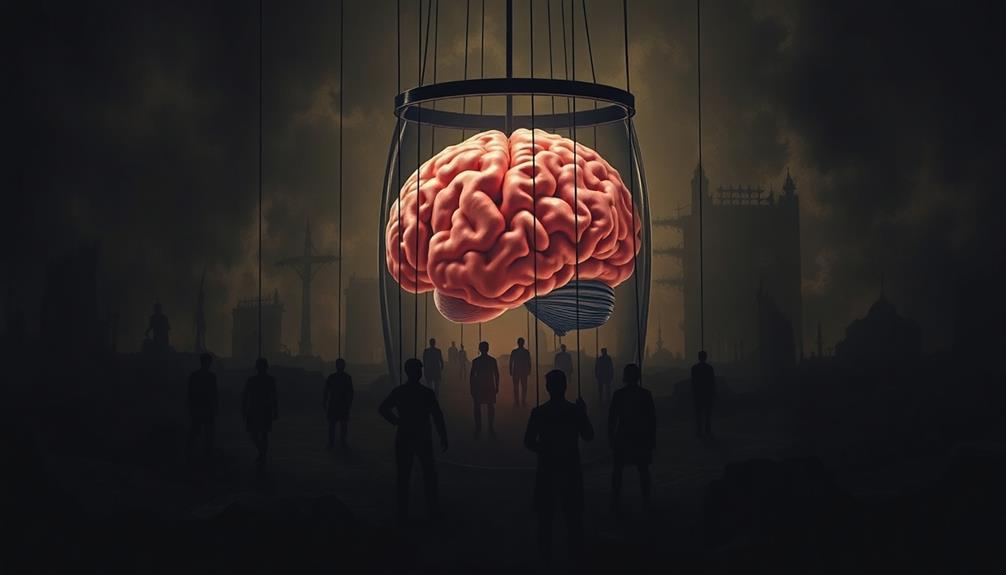
Recent neurological studies have thrown a wrench into the traditional view of free will, suggesting that our decisions might be more influenced by unconscious processes than we realize.
For instance, research led by Benjamin Libet indicates that brain activity related to decision-making can occur up to 10 seconds before you consciously perceive your choice. Similarly, Haynes et al.'s fMRI studies reveal that your decisions can be predicted several seconds before you're aware of them.
These findings challenge the notion of conscious control over free will and highlight the complexity of human behavior. Additionally, just as honey varieties may influence health, our choices could be swayed by underlying factors beyond our conscious awareness.
Consider these critical points:
- Unconscious Initiation: Many actions may start from unconscious brain activity.
- Predictability: Your choices can be anticipated before you consciously make them.
- Influence of Stimuli: External factors can sway your decisions without your awareness.
- Biochemical Influences: Your actions might stem from neurological factors rather than deliberate choices.
- Moral Responsibility: These insights raise significant questions about accountability and ethics.
This neurological evidence complicates how we view free will and moral responsibility, suggesting that our choices mightn't be as autonomous as we believe.
Psychological Implications of Skepticism
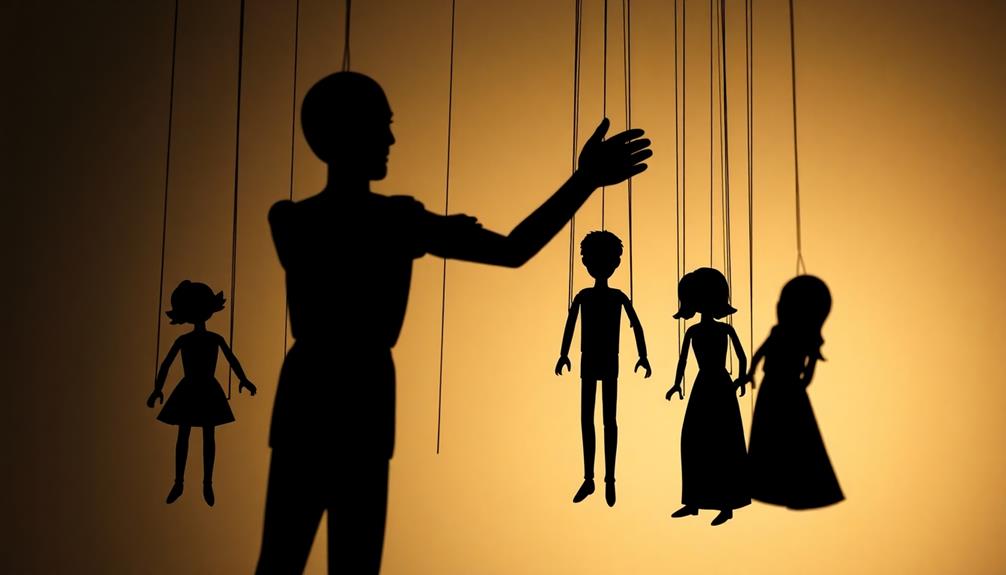
The skepticism surrounding free won't only challenge our philosophical beliefs but also has profound psychological implications. Research shows that when you diminish your belief in free will, you may engage in moral disengagement, leading to increased cheating and anti-social behavior. This connection between skepticism and ethical conduct suggests that the belief in free will plays a crucial role in maintaining personal accountability.
Additionally, embracing a belief in free will can foster resilience, allowing individuals to reset and restart their lives after setbacks, particularly when faced with emotional distress resetting life after setbacks.
Moreover, rejecting free will can heighten emotional distress, negatively impacting your mental well-being. When you perceive yourself as lacking the ability to choose, you might adopt a victim mentality, which could diminish your motivation for personal growth or change. This mindset can trap you in a cycle of helplessness, making it difficult to pursue meaningful goals.
Saul Smilansky's concept of "illusionism" emphasizes the importance of maintaining a belief in free will for emotional well-being and social cohesion. By fostering a sense of moral responsibility, this belief supports a healthier psychological state and promotes positive social interactions.
Ultimately, the skepticism surrounding free will may lead to serious consequences for your emotional health and personal development.
Cultural Reactions to Free Will
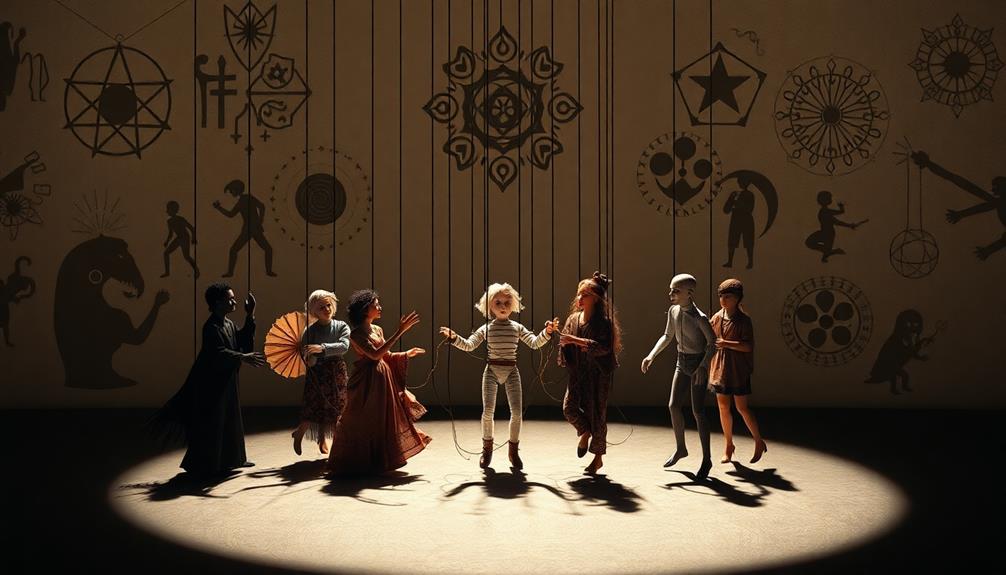
Throughout history, cultures have reacted strongly to the skepticism surrounding free will, often reshaping their moral and ethical frameworks in response. When belief in free will wavers, societies grapple with serious implications for personal agency and accountability.
Here are some cultural reactions you might observe:
- Changes in Justice Systems: Legal systems may adjust to reflect a more deterministic view of behavior, altering how punishment and rehabilitation are approached.
- Shift in Relationships: Diminished belief in free will can lead to increased anti-social behavior and reduced commitment in personal relationships.
- Public Discourse Polarization: A definitive disproof of free will could spark a culture war, similar to that seen over evolution, polarizing communities.
- Impact on Self-Identity: Individuals might struggle with emotional distress and questions of self-identity as the belief in personal agency diminishes.
- Cultural Narratives: Public perceptions shape narratives around accountability, justice, and personal responsibility, influencing societal norms.
As you can see, these cultural reactions illustrate the profound effects skepticism about free will can have on the way societies function and individuals relate to one another.
Compatibilism and Alternative Views

You might find it intriguing how compatibilism bridges the gap between determinism and free will by redefining personal agency.
It suggests that your choices can still be meaningful, even if they're shaped by prior causes.
Additionally, the conversation around moral responsibility raises important questions about whether you can be held accountable for actions within a deterministic framework.
Determinism and Free Will
Philosophers have long debated the relationship between determinism and free will, creating a rich landscape of theories that challenge our understanding of human agency. At its core, determinism posits that every event, including your actions, is determined by preceding events and natural laws. This notion can create tension with the idea of free will, which suggests you have the ability to act independently.
One approach, compatibilism, reconciles these ideas by asserting that you can still be held morally responsible for your actions, even if they're influenced by prior causes.
Here are some key perspectives:
- Libertarians reject determinism, claiming you can make genuinely free choices.
- Semi-compatibilism allows for moral responsibility within a deterministic framework.
- Quantum mechanics introduces indeterminacy at the micro-level, complicating the debate.
- Some argue that moral responsibility can exist regardless of whether free will is truly free.
- The interplay between determinism and free will continues to spark philosophical inquiry.
Understanding these theories can enhance your grasp of moral responsibility and personal agency within the confines of determinism and free will.
Redefining Personal Agency
The debate surrounding free will takes an intriguing turn when examining compatibilism and alternative views on personal agency. Compatibilism suggests that free will and determinism can coexist, redefining personal agency within a deterministic framework. According to philosophers like Daniel Dennett and Eddy Nahmias, you can still act according to your desires and motivations, even if those desires are shaped by prior events. This perspective allows you to appreciate your decision-making process while acknowledging external influences.
Through compatibilism, moral responsibility remains intact. You can be held accountable for your actions, as they stem from your character and intentions. This nuanced understanding emphasizes that you can reflect on your choices, make decisions without coercion, and maintain a sense of agency.
Emerging discussions further expand on this idea, viewing free won't as an absolute concept but as a skill to develop. By fostering self-reflection and awareness of your motivations, you can cultivate a deeper understanding of your choices. In this light, personal agency becomes a dynamic aspect of your life, allowing you to navigate a complex world while embracing your ability to choose.
Moral Responsibility Perspectives
Moral responsibility takes on different shapes within the ongoing discourse around free will, particularly when examining compatibilism and alternative views. Compatibilists argue that you can maintain moral responsibility even in a deterministic framework. Philosophers like Daniel Dennett and Eddy Nahmias assert that as long as you act according to your motivations without coercion, you possess free will.
Consider these perspectives:
- Compatibilism posits that free will and determinism can coexist.
- Semi-compatibilism suggests moral responsibility is independent of free will.
- Derk Pereboom's approach emphasizes rehabilitation and prevention over retribution in justice.
- Saul Smilansky's "illusionism" maintains that believing in free will can encourage moral behavior.
- Consequentialism focuses on the outcomes of actions rather than intentions, redefining moral responsibility.
These views challenge traditional notions of accountability, suggesting that even if your actions are influenced by prior causes, you can still be held responsible.
The debate influences how society perceives justice, punishment, and moral agency, highlighting the complexity of reconciling free will with determinism.
Frequently Asked Questions
Do Humans Truly Have Free Will?
You might wonder if you truly have free will. Research suggests many choices emerge from unconscious processes, challenging the idea that you control every decision. Yet, you still feel a sense of agency in your actions.
What Do Libertarians Believe About Free Will?
Libertarians believe you possess genuine free will, asserting that your choices aren't dictated by prior conditions. They argue that this capacity for independent decision-making is essential for moral responsibility and accountability in your actions.
What Is the Argument Against Free Will?
Studies show that 60% of people believe free will's an illusion. The argument against it suggests all actions stem from prior causes, undermining personal agency and highlighting how unconscious processes shape your decisions without your conscious awareness.
Do Incompatibilists Believe in Free Will?
Incompatibilists don't believe free will can coexist with determinism. They argue that true free will requires the ability to make choices independent of prior causes, which means moral responsibility becomes questionable in a deterministic framework.
Conclusion
As you step back and ponder the threads of your life, consider how they weave together, sometimes beyond your control. Are you the puppeteer or merely a puppet dancing to the whims of fate? Embracing the complexities of free will invites you to explore the vibrant tapestry of choices, beliefs, and the unseen forces that shape your journey. In the end, whether you're pulling the strings or following the dance, understanding these dynamics can illuminate your path forward.
